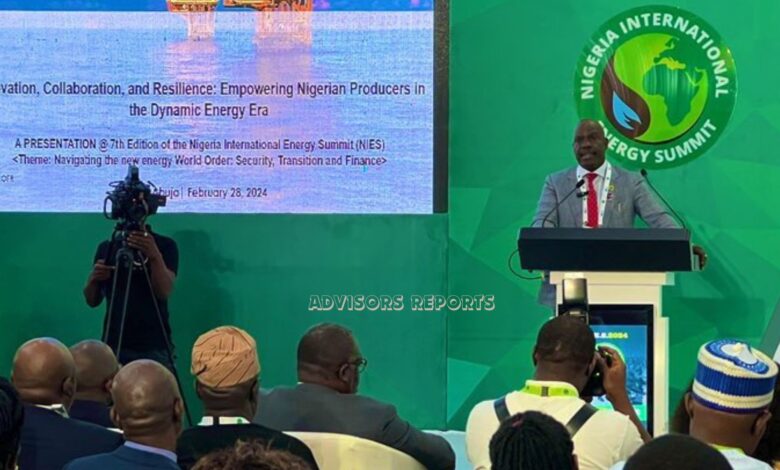Mohammed Shosanya
The Federal Government,says about 1,068 oil and gas projects approved between 2022 and 2023 that are currently ongoing across the country will attract a total of $22.8billion investments.
The Chief Executive,the Chief Executive, NUPRC, Gbenga Komolafe, disclosed this during a panel session at the ongoing 7th Nigeria International Energy Summit in Abuja.
Nigeria’s technical crude oil production potential,he said,was currently 2.26 million barrels per day,adding that the country was gradually approaching the oil production quota approved by the Organisation of Petroleum Exporting Countries.
He spoke on the success story in Nigeria’s oil sector, saying: “A total of 51 Field Development Plans (were) approved in the year 2022 – 2023, expected to attract a total $17.64bn investment inflow as well as deliver cumulative oil recovery and gas recovery estimated at 2.12 billion barrels and 13.13 trillion cubic feet respectively in the next five years.
“A total of circa $2.5bn investment in 175 wells drilling in the year 2022 – 2023. A total of $2.68bn investment in 842 well workovers and other well intervention activities in the year 2022 – 2023 resulting in increased average oil production.
“275 per cent growth in rig count from just eight in 2021 to average of 30 in the past one year. Early first oil achieved in recently streamed fields through accelerated FDPs.
“Some of the fields include: Ikike (Total), Efe field (Newcross), Utapate, (NEPL), Akubo Field (SEEPCo), Oyo (General Hydrocarbon) and several others streamed under Extended Well Tests including Ethiope, Omefejo, Ofa, Olure, Ibom, Apani, Kalaekule, etc.”
According to him,though the actual national crude oil production currently averages 1.33 million barrels per day and 256,000 barrels of condensate per day, the national technical production potential currently stands at 2.26 million bpd, while the current OPEC quota is 1.5 million bpd.
“Closing the gap between the actual oil production and the technical potential presents a window of investment opportunities for investors and a significant opportunity for Nigeria to unlock additional revenue streams, address the current foreign exchange gap and strengthen her economic resilience. So there is opportunity in every disability,” he stated.
He said the commission had also intensified efforts in collaborating with the International Oil Companies to ensure accelerated maturation and development of some high volume deep offshore assets.
“The commission has created further investment opportunities through the ongoing licensing round for seven deepwater acreages, as well as the proposed 2024 closed bids expected to increase the nation’s reserve and production and boost national revenue.
“At this point, permit me to reiterate that both open and closed bids are permissible by the law as Section 73(1) of the PIA does not preclude either approach, so far as the licensing round is ‘…based on a fair, transparent and competitive bidding process’.”
He noted that in addition, huge opportunities also exist in Seismic acquisition on multiclient basis, development of deeper hydrocarbon opportunities, drilling and well services in both green and several mature fields, waste management, etc.
“There are also business prospects in decarbonisation and carbon-pricing system currently being stewarded by the commission. Each of these areas provide a unique entry point for willing investors,” Komolafe stated.
He also reassured willing investors that implementation of the Host Communities Development Trust (HCDT) provisions of the PIA has restored confidence and created social inclusion for the host communities by the operators.
According to him, the Commission, in carrying out its oversight roles, has registered a total of One Hundred and Three (103) HCDTs, and has deployed an intelligent digital, platform for reporting, monitoring, and ensuring transparent administration of the HCDTs for sustainable operations in the Nigerian communities.
NUPRC boss further stated that the Commission is at the forefront of a national mission to achieve a zero-flare target by 2030 and net zero carbon emissions by 2060.
He stated that spearheading this ambitious drive are various initiatives, notably the innovative flare commercialization program known as the NGFCP.
Komolafe stated that the establishment of a College of Awardees, post the allocation of 49 NGFCP flare sites, serves as a platform for honorees to share expertise, connect with stakeholders, and access vital support systems.
This collaborative effort, according to him, aims to unite top-tier service providers, technology experts, financiers, and multilateral agencies to ensure the seamless execution of flare commercialization projects.
Besides,the NUPRC’s boss highlighted the organization’s remarkable progress in embracing innovation, this includes, transitioning from manual operations to a tech-driven approach over the last three years, which has further empowered NUPRC to harness data analytics and artificial intelligence.
He said, “This shift has not only optimized efficiency but also enabled informed decision-making, eradicated delays, and bolstered productivity, transparency, and accountability.
“Moreover, this tech evolution has instilled a culture of technological advancement within Nigeria’s oil and gas sector, with companies increasingly investing in cutting-edge technologies like data analytics,” Engr. Komolafe said.

